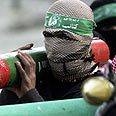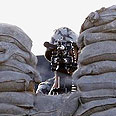

The Palestinian organization recently boosted its forces in the Strip in a number of centers and headquarters, especially those located on the battle line. Some headquarters have even been evacuated.
Such a situation may lead to a security-related escalation, which would be accompanied by rockets fired at Israel and Israeli air strikes in Gaza.
Despite the ongoing attempts to prevent the firing of rockets by other armed organizations operating in the Strip, Hamas is also working to improve its relations with those groups and has begun making statements that Gaza must prepare for an Israeli offensive.
A Gaza source says that Hamas does not plan to initiate any rocket fire in the near future, but that this will be "inevitable" if the blockade is worsened and the Egyptian separation fence construction works are accelerated.
Egyptian threats that the smuggling tunnels in the Rafah area would be "seriously dealt with" have led to a sharp price hike. The price of a ton of cement, which stood at more than NIS 2,000 (about $526) in the peak of the siege and recently dropped to NIS 900 ($237), has now reached the price of NIS 1,500 ($395).
At 11:20 am on Sunday, the exact time at which Operation Cast Lead was launched one year ago, a minute-long siren was sounded throughout the Gaza Strip as residents of the coastal enclave stood to pay their respects to victims of the offensive.
In addition, a number of rallies were held throughout the Gaza Strip, and Hamas prime minister Ismail Haniyeh gave a televised speech.
In a statement to the press, Haniyeh said that the war wasn't a walk in the park for the enemy and that new war will bring about another defeat for the enemy: "The Strip won because of its durability and the Zionist enemy's failure to implement the objectives it set for itself during the war. The resistance continued in its path and forced the enemy to retreat without giving up on even one of its principles and its right to bear arms and defend the Palestinian people."















